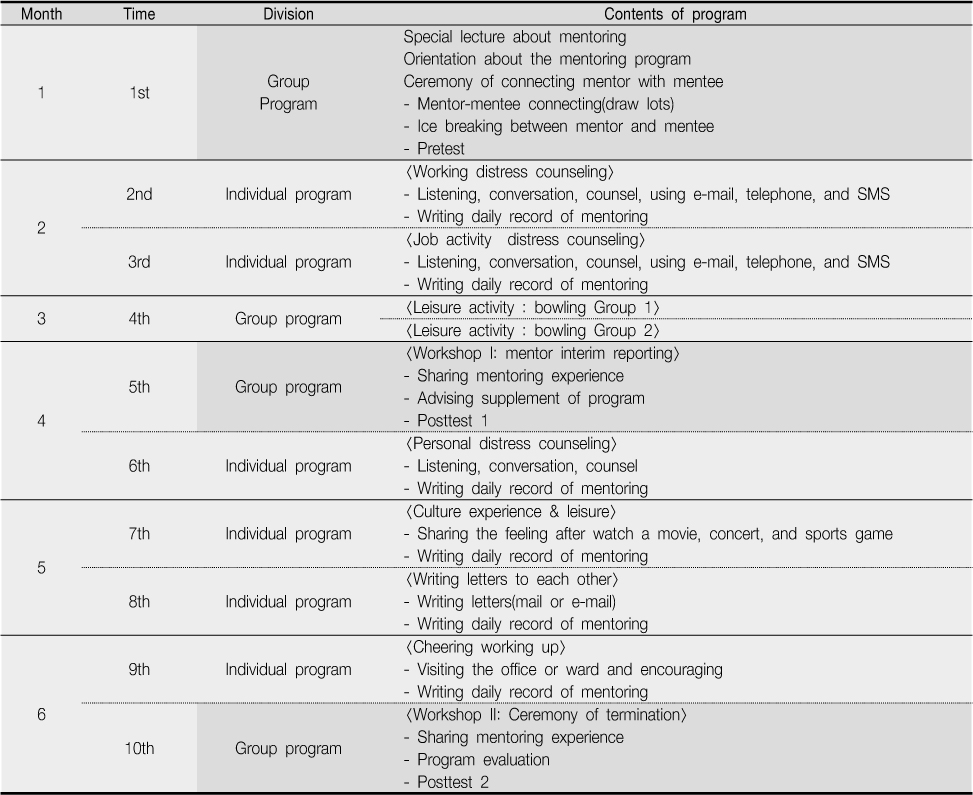J Korean Acad Nurs Adm.
2010 Mar;16(1):48-58.
Effects of the Mentoring Program as a Strategy for Retention of Clinical Nurses
- Affiliations
-
- 1Keimyung University College of Nursing, Korea.
- 2Seogok Elementary School, Korea. l22jh22@hanmail.net
- 3Dongsan Medical Center, Korea.
Abstract
- PURPOSE
The purpose of this study was to identify the effect of a mentoring program as a strategy for the retention of clinical nurses. METHOD: Research subjects were 20 mentors, 20 mentees and 22 clinical nurses for a control group of mentees. A mentoring program was developed by an expert committee and applied to the experimental group for six months. Data were collected at three and six months after the application of the program from September, 2008 to March, 2009. Data were analyzed using chi-square-test, t-test, Repeated Measures ANOVA, One-way ANOVA in SPSS/Win 15.0 Program.
RESULTS
Job satisfaction, organizational commitment, empowerment, and carrier commitment in the mentees of the experimental group were significantly higher than the nurses of the control group. Intention of resignation in mentees of the experimental group were significantly lower than the nurses of the control group. Also, there were significant interaction between the groups and the times of measurements in all variables.
CONCLUSION
The mentoring program showed positive impact on the variables for maintenance of clinical nurses. Recommendation: Based on these findings, retention strategies using mentoring programs were recommended to reduce clinical nurses' resignation and improve the competency of clinical nurses that leads to the productivity of nursing organizations.
Keyword
MeSH Terms
Figure
Reference
-
1. Aryee S, Tan K. Antecedents and outcomes of career commitment. J Vocat Behav. 1992. 40:283–305.
Article2. Barton DS, Gowdy M, Hawthorne BW. Mentorship programs for novice nurses. Nurs Lead. 2005. 3(4):41–44.
Article3. Caine RM. A comparative survey of mentoring and job satisfaction: perception of clinical nurse specialists. 1989. California, USA: Pepperdine university;Unpublished doctoral dissertation.4. Chandler GE. The relationship of nursing work environment to empowerment and powerlessness. 1986. Salt Lake City, Utah: University of Utah;Unpublished doctoral dissertation.5. Chung TW, Han JW, Jung YK. Mentoring, satisfaction, and organizational citizenship behavior of part time employees in a sport organization. J Sport Leis Stud. 2007. 30:349–360.
Article6. Cuesta CW, Bloom KC. Mentoring and job satisfaction; perceptions of certified nurse-midwives. J Nurse Midwifery. 1998. 43(2):111–116.
Article7. Dunham-Taylor J, Lynn CW, Moore P, McDaniel S, Walker JK. What goes around comes around: improving faculty retention through more effective mentoring. J Prof Nurs. 2008. 24(6):337–346.
Article8. Fagan MM, Fagen PD. Mentoring among nurses. Nurs Health Care. 1983. 4:77–82.9. Joiner TA, Bartram T, Garreffa T. The Effects of Mentoring on Perceived Career Success, Commitment and Turnover Intentions. J Am Acad Bus Camb. 2004. 5:164–170.10. Kanter RM. The change masters. 1983. New York: Simon & Schuster.11. Kim HO, Lee BS. The influence of nursing organizational commitment and job satisfaction on intention of resignation of clinical nurses. J Korean Acad Nurs Adm. 2001. 7(1):85–95.12. Kim MR. Influential Factors on Turnover Intention of Nurses; The Affect of Nurse's Organizational Commitment and Career Commitment to Turnover Intention. J Korean Acad Nurs Adm. 2007. 13(3):335–344.13. Koo OH. Clinical nurses's perception of empowerment structural model in nursing organization. 2000. Taejon: Chungnam National University;Unpublished doctoral dissertation.14. Laschinger HK. A theoretical approach to studying work empowerment in nursing: A review of studies resting Kanter's theory of structural power in organizations. Nurs Adm Q. 1996. 20(2):25–41.15. Lee GT, Kim LC, Cho NK. A study on effect of mentoring on organizational commitment moderated by emotional intelligence. 2008. Daegu: Korean Academic Society of Hospitality Administration.16. Lee HR, Lee YM, Ahn YY. The effect of hotel employee's perceived mentoring function on their career commitment and team commitment: Focusing on moderating effect of hotel employee's personality type. Korean J Hosp Adm. 2009. 18(2):1–26.17. Mentoring Korea Consulting. Successful case of mentoring on Eland, GE, samsung, and university. Retrieved July 23, 2008. from http://www.mkc21.co.kr.18. Ministry of education, science, and technology. Annual statistics report. 2001. Seoul: Ministry of education, science, and technology.19. Mowday RT, Steers , Porter LW. The management of organization Commitment. J Vocat Behav. 1979. 14:224–247.20. Nelson D, Godfrey L, Purdy J. Using a mentorship program to recruit and retain student nurses. J Nurs Adm. 2004. 34(12):551–553.
Article21. Park HH, Park KS, Yom YH, Kim KH. Impact of clinical nurses' power and empowerment on job satisfaction and organizational commitment. J Korean Acad Nurs. 2006. 36(2):244–254.
Article22. Persaud D. Mentoring the new graduate perioperative nurse: A valuable retention strategy. AORN J. 2008. 87(6):1173–1179.
Article23. Price JL, Mueller CW. Professional turnover: The case for nurses. 1981. Ames: Iowa State University.24. Ragins BR, Cotton JL, Miller JS. Managerial mentoring: The effects of type of mentor, quality of relationship, and program design on work and career attitudes. Acad Manage J. 1999. 43(6):1177–1194.
Article25. Scandura TA. Mentorship and career mobility: An empirical investigation. J Organ Behav. 1992. 13:169–174.
Article26. Shader K, Broome ME, Broome CD. Factors influencing satisfaction and anticipated turnover for nurses in an academic medical center. J Nurs Adm. 2001. 31(4):210–216.
Article27. Shin YJ, Kim MS. A study on successful practices of mentoring programs. Dongduk J Life Sci Stud. 2005. 10:99–111.28. Shin YK. Management of human respect. 1997. Seoul: Dasan.29. Sullivan MA. Relationships among planned mentoring programs, job satisfaction, and intent to stay in nurse faculty mentees. 2001. Birmingham, USA: Alabama University;Unpublished doctoral dissertation.30. The Korean Research Institute for Nursing Policy. Study of analysis on the status of active nurses and inactive nurses. 2006. Seoul: Author.
- Full Text Links
- Actions
-
Cited
- CITED
-
- Close
- Share
- Similar articles
-
- The Effects of Mentoring Functions and Job Satisfaction on Turnover Intention according to Nurses' Mentoring Phases
- Effects of Professional Self-concept and Nursing Organizational Culture on Intention of Retention of Middle-aged Nurses
- A Scoping Review on the Clinical Supervision and Mentoring for Nurses in Maternal and Child Health
- A Mentoring Program for Stress Management among Korean Adolescents
- Effects of Nurses' Mentoring on Turnover Intention: Focused on the Mediating Effects Role Stress and Burnout



